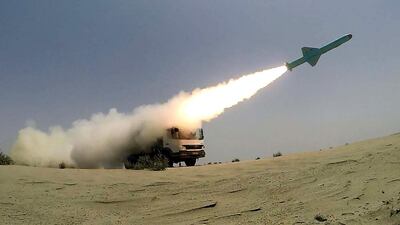Cruise missiles have significantly proliferated with dozens of states including Iran now in possession of advanced models, a new report shows.
With improved guidance systems, the weapons are now able to fly more complex missions, including swarm attacks similar to that carried out by Iran against a Saudi Aramco oil base in 2019.
The European Leadership Network investigation said that the increasing adoption of “multi-effect warheads” means that cruise missiles will become far more destructive with an increasing number of countries making nuclear-tipped weapons.
“The proliferation of cruise missiles has far-reaching strategic implications,” it said. “In a strained regional context this has the potential to undermine conventional and nuclear crisis stability.”
While current missiles were powered with liquid-fuel turbojet and turbofan engines, making them travel at a relatively mild Mach 1 or 1,230kph, the possibility of solid-fuel ramjets being developed could make them six times faster at 7,400kph and very difficult to defend against.
A main reason for the proliferation is the rise of effective American ballistic missile defence systems, such as Patriot missiles or the Arleigh Burke and Zumalt class destroyers.
"States like China and Russia, and also Iran, have been driven towards ballistic-missile alternatives, including cruise missiles," the report said.
It noted that Iran’s cruise missile programme benefited greatly from illegal transfers of Russian air-launched Kh-55s from Ukraine, which have a range of 2,500 kilometres.
The report highlighted the export of Russian-made SSN-27 Sizzler cruises missiles to Iran that have a range of 300km, a speed of nearly Mach 1 and carry a 450-kilogram warhead.
Today, dozens of states are in possession of advanced cruise-missile capabilities, including both anti-ship and land-attack cruise missiles
The report, Cruise Missile Proliferation, said that the numbers have grown significantly, creating a danger of nuclear strikes.
“Today, dozens of states are in possession of advanced cruise-missile capabilities, including both anti-ship and land-attack cruise missiles. In addition, nuclear-capable cruise missiles have proliferated significantly, a trend that can be expected to continue in the future.”
The ELN, a non-partisan group of 200 past, present and future European leaders, urged for a “comprehensive trilateral dialogue” between the US, Russia and China.
The authors offered suggestions to counter the potentially deadly consequences of cruise missile proliferation.
"A proactive attitude is required in order to counter the negative strategic implications of cruise missile proliferation and to reverse this dangerous proliferation trend," the report said.
“The international community should pursue a short-term agenda of establishing confidence and transparency-building measures surrounding the deployment and use of cruise missiles, while focusing on comprehensive and verifiable arms control agreements in the long term.”
Bugatti Chiron Super Sport - the specs:
Engine: 8.0-litre quad-turbo W16
Transmission: 7-speed DSG auto
Power: 1,600hp
Torque: 1,600Nm
0-100kph in 2.4seconds
0-200kph in 5.8 seconds
0-300kph in 12.1 seconds
Top speed: 440kph
Price: Dh13,200,000
Bugatti Chiron Pur Sport - the specs:
Engine: 8.0-litre quad-turbo W16
Transmission: 7-speed DSG auto
Power: 1,500hp
Torque: 1,600Nm
0-100kph in 2.3 seconds
0-200kph in 5.5 seconds
0-300kph in 11.8 seconds
Top speed: 350kph
Price: Dh13,600,000
The nine articles of the 50-Year Charter
1. Dubai silk road
2. A geo-economic map for Dubai
3. First virtual commercial city
4. A central education file for every citizen
5. A doctor to every citizen
6. Free economic and creative zones in universities
7. Self-sufficiency in Dubai homes
8. Co-operative companies in various sectors
9: Annual growth in philanthropy
White hydrogen: Naturally occurring hydrogen
Chromite: Hard, metallic mineral containing iron oxide and chromium oxide
Ultramafic rocks: Dark-coloured rocks rich in magnesium or iron with very low silica content
Ophiolite: A section of the earth’s crust, which is oceanic in nature that has since been uplifted and exposed on land
Olivine: A commonly occurring magnesium iron silicate mineral that derives its name for its olive-green yellow-green colour
The specs
- Engine: 3.9-litre twin-turbo V8
- Power: 640hp
- Torque: 760nm
- On sale: 2026
- Price: Not announced yet
Defence review at a glance
• Increase defence spending to 2.5% of GDP by 2027 but given “turbulent times it may be necessary to go faster”
• Prioritise a shift towards working with AI and autonomous systems
• Invest in the resilience of military space systems.
• Number of active reserves should be increased by 20%
• More F-35 fighter jets required in the next decade
• New “hybrid Navy” with AUKUS submarines and autonomous vessels
The specs: 2018 BMW X2 and X3
Price, as tested: Dh255,150 (X2); Dh383,250 (X3)
Engine: 2.0-litre turbocharged inline four-cylinder (X2); 3.0-litre twin-turbo inline six-cylinder (X3)
Power 192hp @ 5,000rpm (X2); 355hp @ 5,500rpm (X3)
Torque: 280Nm @ 1,350rpm (X2); 500Nm @ 1,520rpm (X3)
Transmission: Seven-speed automatic (X2); Eight-speed automatic (X3)
Fuel consumption, combined: 5.7L / 100km (X2); 8.3L / 100km (X3)
Marathon results
Men:
1. Titus Ekiru(KEN) 2:06:13
2. Alphonce Simbu(TAN) 2:07:50
3. Reuben Kipyego(KEN) 2:08:25
4. Abel Kirui(KEN) 2:08:46
5. Felix Kemutai(KEN) 2:10:48
Women:
1. Judith Korir(KEN) 2:22:30
2. Eunice Chumba(BHR) 2:26:01
3. Immaculate Chemutai(UGA) 2:28:30
4. Abebech Bekele(ETH) 2:29:43
5. Aleksandra Morozova(RUS) 2:33:01
Tips to stay safe during hot weather
- Stay hydrated: Drink plenty of fluids, especially water. Avoid alcohol and caffeine, which can increase dehydration.
- Seek cool environments: Use air conditioning, fans, or visit community spaces with climate control.
- Limit outdoor activities: Avoid strenuous activity during peak heat. If outside, seek shade and wear a wide-brimmed hat.
- Dress appropriately: Wear lightweight, loose and light-coloured clothing to facilitate heat loss.
- Check on vulnerable people: Regularly check in on elderly neighbours, young children and those with health conditions.
- Home adaptations: Use blinds or curtains to block sunlight, avoid using ovens or stoves, and ventilate living spaces during cooler hours.
- Recognise heat illness: Learn the signs of heat exhaustion and heat stroke (dizziness, confusion, rapid pulse, nausea), and seek medical attention if symptoms occur.


